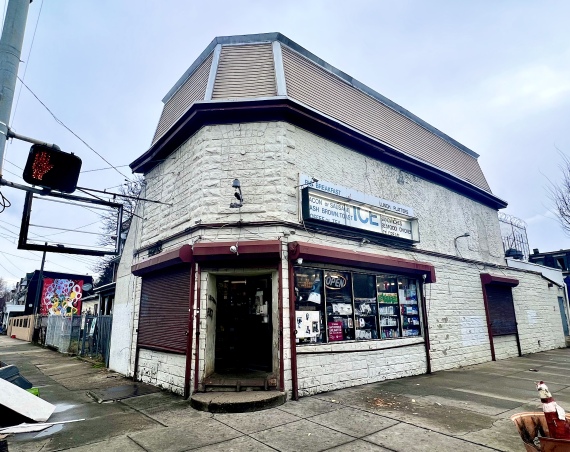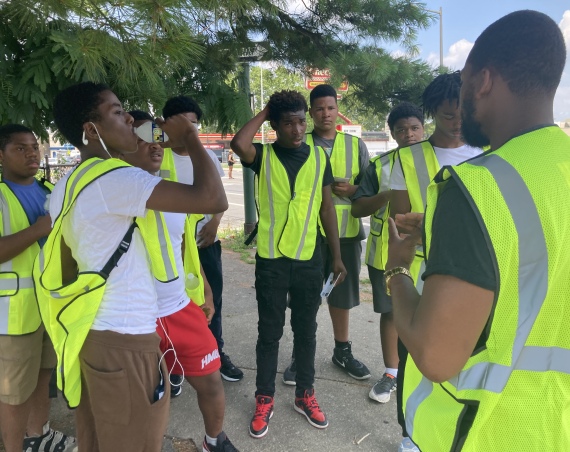Face to Face has served meals to Germantown residents and families since 1984. The tradition has helped the organization develop its Hospitality, Mutuality, and Transformation model for serving people living in need. Today, the organization offers health, legal, and social services while continuing to serve meals. One of the social services center programs is helping residents obtain birth certificates to live fuller lives and access essential needs like a passport, employment, driver’s license/state identification, social security card, and school enrollment.
The birth certificate clinics run monthly in the gymnasium of the organization and are staffed by volunteers from Villanova Law school. Face to Face Staff Attorney John Winicov trains the students to conduct the birth certificate retrieval process. Each clinic has about ten students, eight of which will work with residents. The clinics have a capacity of 40 participants on a first-come-first-served basis, and the guests are usually from Germantown or the surrounding neighborhoods.
Villanova Law student Lisa McConnell has been helping at the clinics for two years. She used to work on the floor supporting the applicants as they filled out their forms but now greets residents at the door. She says that she enjoys helping at the clinics, and it’s a nice way to “take a break from studying.”
On September 10, the organization hosted its first birth certificate clinic of the season. The clinics are another tradition that has been going on for years, starting in 2008 but is now under the organization of Face to Face’s Winicov. He says that upon beginning his job at Face to Face, he quickly learned the need for a birth certificate.
“Without a birth certificate, you cannot get any other form of identification,” he says. “And without any identification in this country, you are not able to function very well.”
Indeed Winicov is right. It is virtually impossible to make significant life movements without a birth certificate. According to the Pa. Department of Health’s website, you must use the document to prove your identity when applying for a passport, employment, driver’s license/state identification, Social Security card, and school enrollment. Winicov mentioned all of these when discussing the barriers to not having a birth certificate, including public benefits. These clinics help residents take the first step into obtaining one of the abovementioned things.
One birth certificate applicant at the September 10th clinic, who wished to remain anonymous, says he had to obtain the document because he is enrolling in community college. “I actually didn’t lose mine,” he says. “I have a big hole in my original, and the school said they couldn’t accept it. Otherwise, I would have kept using that one.”
Another anonymous applicant says her original birth certificate was stolen, and she missed out on opportunities like housing because of it. “Without it, what can you do?” she questioned. “It causes a lot of challenges besides just identification.”
The other benefit of this clinic is that it is free, as Face to Face aims to benefit low-income and unhoused folks in the Germantown area. The organization advertises that the clinic is for individuals earning up to 150% of the federal poverty guidelines. U.S. Census Bureau data states that 22.8% of Philadelphians live in poverty. Census data also suggests that 29.8% of residents in 19144 (Germantown) live in poverty, and 22.1% of 19138 (East Germantown) do. Averaged out, nearly 26% of residents between both zip codes live in poverty, which is higher than in Philadelphia overall.
While people can always visit their local vital records office to file for new birth certificates, certificates are $20 each and require a $10 processing fee. For low-income families who may have lost multiple birth certificates in a fire, during a move, or while escaping a domestic abuse situation, which McConnell says are common, eliminating those multiplied fees could be very helpful.
The other way is online at mycertificates.health.pa.gov. But as Winicov states, not everybody has computer or internet access. “Then you’d need a printer,” he says. “Because in Pennsylvania, you have to sign [the form] and mail it.”
These clinics could be a valuable resource for first-time voters in the upcoming November 8th General Election. While voter identification laws vary across states, in Pennsylvania, you only need to show identification the first time you vote and again only if you switch polling places. While birth certificates are not eligible identification to vote, you would need one to obtain a PennDOT ID Card, driver’s license, passport, and other approved forms.
Winicov says, “we’re really fortunate to have the ability to provide this service. I feel very fortunate to be involved in providing such a needed service to the community and to our guests. And we’re very, very lucky to have Villanova Law school collaborating with us in this program.”
Germantown residents who meet the income requirements have two more opportunities to reobtain a birth certificate for free this season. The next clinic is on October 15, and the following is on November 5. No documentation is required, but you are encouraged to get there closer to the start time at 10 a.m., as it is first-come-first-served.



